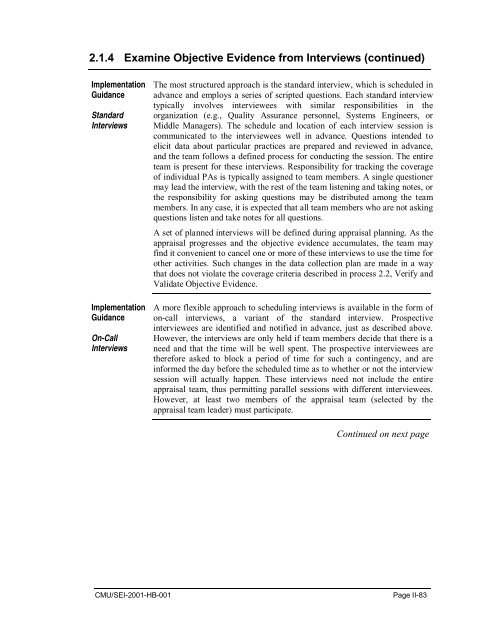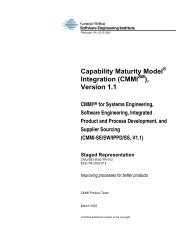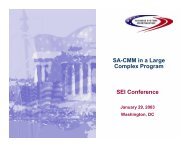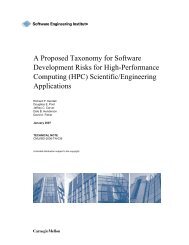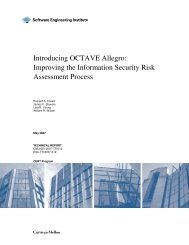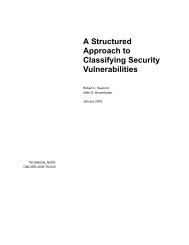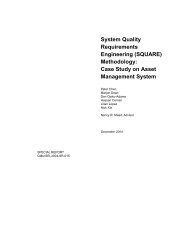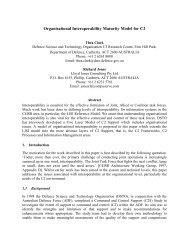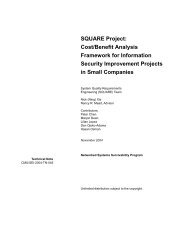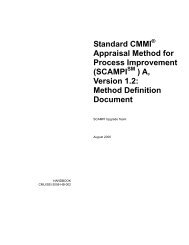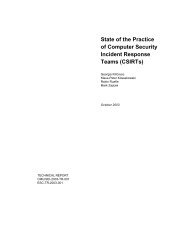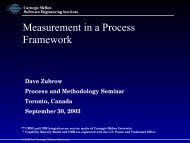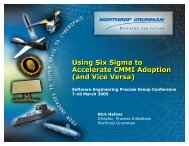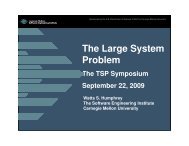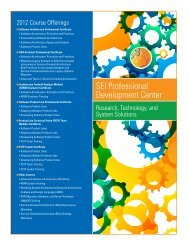Standard CMMI Appraisal Method for Process Improvement (SCAMPI)
Standard CMMI Appraisal Method for Process Improvement (SCAMPI)
Standard CMMI Appraisal Method for Process Improvement (SCAMPI)
Create successful ePaper yourself
Turn your PDF publications into a flip-book with our unique Google optimized e-Paper software.
2.1.4 Examine Objective Evidence from Interviews (continued)<br />
Implementation<br />
Guidance<br />
<strong>Standard</strong><br />
Interviews<br />
Implementation<br />
Guidance<br />
On-Call<br />
Interviews<br />
The most structured approach is the standard interview, which is scheduled in<br />
advance and employs a series of scripted questions. Each standard interview<br />
typically involves interviewees with similar responsibilities in the<br />
organization (e.g., Quality Assurance personnel, Systems Engineers, or<br />
Middle Managers). The schedule and location of each interview session is<br />
communicated to the interviewees well in advance. Questions intended to<br />
elicit data about particular practices are prepared and reviewed in advance,<br />
and the team follows a defined process <strong>for</strong> conducting the session. The entire<br />
team is present <strong>for</strong> these interviews. Responsibility <strong>for</strong> tracking the coverage<br />
of individual PAs is typically assigned to team members. A single questioner<br />
may lead the interview, with the rest of the team listening and taking notes, or<br />
the responsibility <strong>for</strong> asking questions may be distributed among the team<br />
members. In any case, it is expected that all team members who are not asking<br />
questions listen and take notes <strong>for</strong> all questions.<br />
A set of planned interviews will be defined during appraisal planning. As the<br />
appraisal progresses and the objective evidence accumulates, the team may<br />
find it convenient to cancel one or more of these interviews to use the time <strong>for</strong><br />
other activities. Such changes in the data collection plan are made in a way<br />
that does not violate the coverage criteria described in process 2.2, Verify and<br />
Validate Objective Evidence.<br />
A more flexible approach to scheduling interviews is available in the <strong>for</strong>m of<br />
on-call interviews, a variant of the standard interview. Prospective<br />
interviewees are identified and notified in advance, just as described above.<br />
However, the interviews are only held if team members decide that there is a<br />
need and that the time will be well spent. The prospective interviewees are<br />
there<strong>for</strong>e asked to block a period of time <strong>for</strong> such a contingency, and are<br />
in<strong>for</strong>med the day be<strong>for</strong>e the scheduled time as to whether or not the interview<br />
session will actually happen. These interviews need not include the entire<br />
appraisal team, thus permitting parallel sessions with different interviewees.<br />
However, at least two members of the appraisal team (selected by the<br />
appraisal team leader) must participate.<br />
Continued on next page<br />
CMU/SEI-2001-HB-001<br />
Page II-83


